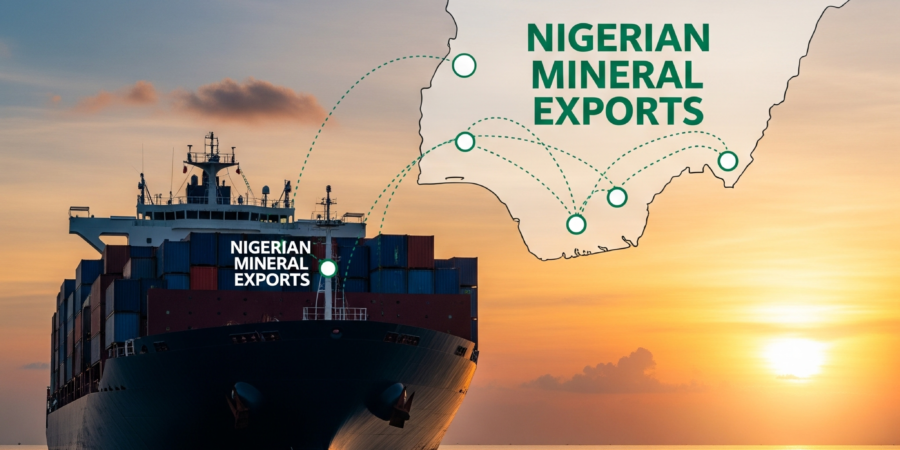Your mining venture has been successful. You’ve secured the license, sourced the minerals, and found a buyer. But the journey from the mine to the global market is the most delicate phase of all. It requires a precise understanding of shipping, customs, and logistics. A single misstep can lead to costly delays, seized goods, or a broken business relationship.
This guide provides a comprehensive handbook on the logistics of mineral export from Nigeria, revealing the key documents, processes, and players you need to master to ensure your goods reach their destination on time, in perfect condition, and without a single hiccup.

The 3-Step Logistics Blueprint
Mastering mineral export logistics is about following a clear, documented process. It is a well-choreographed dance between multiple agencies and your freight forwarding partner.
Step 1: The Pre-Shipment Documentation
This is the most critical stage. All your permits and legal documents come together to create a single, irrefutable export file. Without these, your shipment will not even get to the port.
- The NXP Form: The cornerstone of your export. The Nigerian Export Proceeds (NXP) Form is a mandatory document that must be processed electronically through your commercial bank before any shipment. It is a declaration to the Central Bank of Nigeria (CBN) and a prerequisite for all subsequent processes.
- Mineral Export Permit: This permit, issued by the Ministry of Solid Minerals Development (MSMD), must be secured for each specific shipment. It verifies that your goods are legally authorized for export. You also need the Nigerian Export Promotion Council (NEPC) Export Permit, which is a legal requirement for all exports from Nigeria.
- Clean Certificate of Inspection (CCI): This certificate is issued by a government-appointed pre-shipment inspection agent. It verifies the quality, quantity, and market value of your minerals and is a mandatory document for Customs clearance.
- Other Key Documents: You will also need your commercial invoice, packing list, and a Certificate of Origin issued by a recognized body like the National Association of Chambers of Commerce, Industry, Mines and Agriculture (NACCIMA) to prove your goods are of Nigerian origin.
Step 2: Engaging a Freight Forwarder
Your freight forwarder is your single most important partner in this entire process. They are not just a transport company; they are a logistics expert who manages the entire journey from your warehouse to the final port.
What to Look For in a Freight Forwarder:
- Licensing: Ensure they are registered with the Council for the Regulation of Freight Forwarding in Nigeria (CRFFN) and are a licensed customs agent.
- Experience: They should have a track record of handling solid minerals, as this type of cargo has specific handling requirements and customs codes.
- Transparency: A reputable forwarder will provide a transparent breakdown of all costs, including freight, customs duties, and port charges, with no hidden fees.
Your forwarder will handle all the heavy lifting, including booking shipping space, preparing the Bill of Lading (for sea freight) or Air Waybill (for air freight), and managing the customs clearance process at the port.
Step 3: Customs and Port Clearance
This is the final hurdle before your goods are shipped. Your freight forwarder and customs agent will present the comprehensive export file to the Nigerian Customs Service (NCS) at the port. Once all documents are verified and any necessary duties are paid, Customs will release the goods for shipment.
The Nigerian Ports Authority (NPA) is responsible for managing all port operations and ensuring your cargo is loaded and shipped efficiently. They work with shipping lines to ensure timely berthing and loading.
Why Logistics Is Your Most Critical Investment
Poor logistics is the leading cause of failed export deals. Delayed shipments, damaged goods, or incomplete documentation can result in your buyer canceling the contract. By investing in a professional approach to logistics, you safeguard your entire business and build a reputation for reliability.
If you are a serious investor who wants to move quickly and avoid the hidden costs of red tape, our Mining & Mineral Trading Company Setup (Nigeria) service is a done-for-you solution that handles every aspect of your legal and regulatory setup, including the initial documentation for your export-ready business.
For a deeper dive into the legal requirements that precede this process, our ebook Nigerian Mining Industry: Environmental and Regulatory Compliance is your essential guide.
Once your business is legally established, the Nigerian Mineral Exchange provides a platform for you to sell your legally-sourced minerals to a global audience, turning your compliance into a competitive advantage.
📘 The Nigeria Mineral Trading & Licensing Blueprint (2026 Edition)
If you are serious about buying, selling, or trading minerals legally in Nigeria, you cannot afford to rely on guesswork, outdated advice, or hearsay. The regulatory environment is tightening fast, and costly mistakes now lead to permit denials, seizures, or permanent blacklisting.
That’s why we created The Nigeria Mineral Trading & Licensing Blueprint: 2026 Guide to Buying Center Licenses & Purchase Permits — an updated, clear, step-by-step, insider guide that shows you exactly how to obtain Mineral Buying Center Certificates, Purchase & Possession Permits, and related approvals without delays or regulatory traps.
This guide distills real regulatory procedures for 2026, compliance requirements, and practical insights used by serious operators — saving you months of confusion, wasted money, and avoidable risk.
If mineral trading is part of your business future, this blueprint is not optional — it’s protection.
READ ALSO:





Leave a Reply